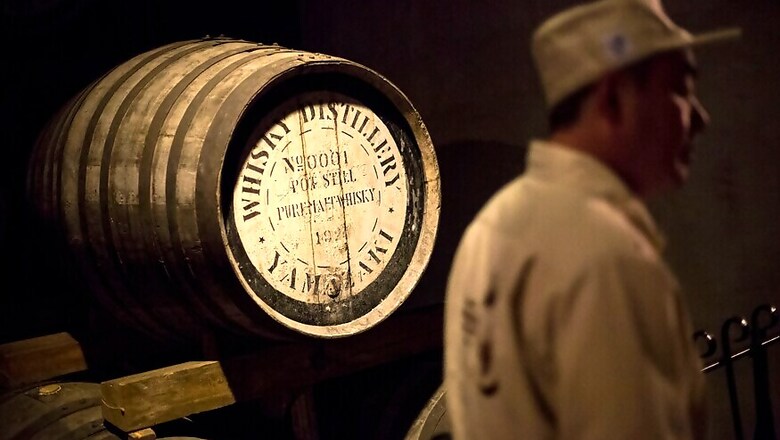
views
 Will the Soul Ever Return to the Body?So, what are the choices Prakash?” I asked.
Will the Soul Ever Return to the Body?So, what are the choices Prakash?” I asked.
“Manu, we have scotch and something called dry martini. I don’t know what the hell the second one is. Should I go for the scotch?” The name dry martini made me sit up. I knew his uncle, who has brought the bottles from abroad. The old man, ignorant of the pedigree of drinks, but still greedy and reluctant to part with the best, would not give it up even for his life if somebody enlightens him with the exciting facts about dry martini.
“Tell your uncle that scotch is the best and you want it, but mark it in your mind that we want the dry martini.”
Prakash disconnected the phone and started begging for the scotch. His uncle smiled. That is how we ended up with the dry martini that evening.
Ok. Things are simple with whisky and dry martini. But how would you choose if it’s a toss-up between two whiskies your expatriate uncle has come back with? How will you read all that Greek written on the label on a bottle of scotch?
Age, non-chill filtering, cask strength, cask filtering…aargh… if only you could read! Don’t pull your hair out just yet. Hop in for this guided tour.
This week we go for age! What does the age of scotch tell us? How should we know?
Any common drinker would say that the more it ages, the better it gets. How much of the adage is true? Should you run that extra mile to procure a 25-year-old scotch, burning all your pockets, hollowing out our cards, making grandfathers squirm in their graves as they see you fritter away a fortune they’d made in order to drink something as old as they are?
It’s true that age points to quality to some extent. True, the more it ages, the more money the whisky extracts from you.
Still...
Does age necessarily mean better? (Forgive me, grandfather. Didn’t mean you)
Whisky acquires taste and character when it sits in meditation inside a cask for long. But how long is too long? Three years is a must for a whisky in Scotland to be called a scotch. At 10-12 years, you get a premium bottle. When up to 20 years, you can argue that the whisky is getting better, picking some good lessons from the wood (only a few whiskies age that far, so they are expensive as hell).
But when the whisky whizzes past 20 years, all bets are off. Now it depends on an individual’s tastes.
Many whisky aficionados argue that the wood in the oak gradually takes the edge out of whisky. After a point, you begin to drink more oak than spirit, they say.
But how do you calculate the age if the whiskey you drink is a symphony of many whiskeys!
About 90 % of the whiskies in market are blends – a mix of more that two whiskies (20 – 50 whiskies is normal). So it is a matter of telling — the age of fifty different whiskies sputtering and coughing at different ages. Vexing indeed, nut not for the Scots.
If the Scots could find a problem with their whisky, they could invent the solution as well.
The law stipulates that the age of a blend is the same as the age of the youngest whisky in it. So, if you accidentally let one drop of a three year old whisky fall into a rare and expensive whisky of 25 years, the age of the Scotch would immediately become the age of that one drop of whisky that fell into it. Period.
You would then ask, as I am sure you would with those naughty pair of eyebrows risen, why the hell anyone would tactlessly bring one drop of young whiskey anywhere near an expensive old one and blast the chance of selling it for a song. Isn’t it suicide? Well, take down the point. A young whisky is not that bad after all, for it could bring a desirable zesty tang to the lethargic and aged whisky.
Many love it. Sometimes, the young and the old sing along nicely, like that wonderful team of good ole’ grandpa and child in one of those lovely homes.
At Ardbeg distillery, it actually happened that they accidentally spilled a young whisky into some very old and rare ones, spoiling its age and its chances of sponging on to antiquity lovers. But at the end, the mix tasted so good that they bottled the liquid monster immediately under the name ‘Serendipity’ – after the way it was born – and sold it without stating an age on the bottle.
So, if a whisky doesn’t state its age on the label, don’t dismiss it right away to tell your uncle you don’t want it. Chances are high that you could be dismissing Johnny Walker Blue Label, one of the most expensive and sought-after blends in the world of whiskies. Since Johnny mixes small amounts of zippy young whiskies with the very special and rare old whiskies, it cannot state its age on the label.
Got the point?
A whisky need not declare its age to prove its honesty and excellence.
(Manu Remakant is a freelance writer who also runs a video blog - A Cup of Kavitha - introducing world poetry to Malayalees. Views expressed here are personal)


















Comments
0 comment